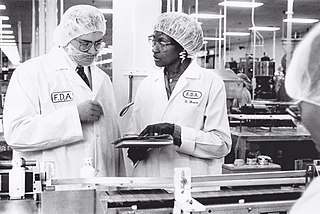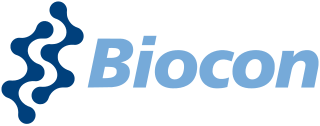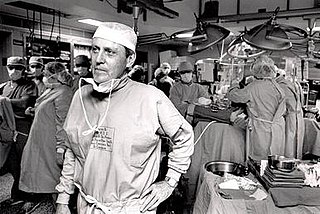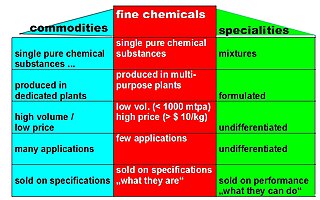
Novartis AG is a Swiss multinational pharmaceutical corporation based in Basel, Switzerland and Cambridge, Massachusetts, United States. Consistently ranked in the global top five, Novartis is one of the largest pharmaceutical companies in the world and was the fourth largest by revenue in 2022.
Genentech, Inc., is an American biotechnology corporation headquartered in South San Francisco, California. It became an independent subsidiary of Roche in 2009. Genentech Research and Early Development operates as an independent center within Roche. Historically, the company is regarded as the world's first biotechnology company.

The pharmaceutical industry discovers, develops, produces, and markets drugs or pharmaceuticals for use as medications to be administered to patients, with the aim to mitigate symptoms or disease conditions, vaccinate them, or alleviate symptoms of disease or surgical or disease condition. Pharmaceutical companies may deal in generic or brand medications and medical devices. They are subject to a variety of laws and regulations that govern the patenting, testing, safety, efficacy using drug testing and marketing of drugs. The global pharmaceuticals market produced treatments worth $1,228.45 billion in 2020 and showed a compound annual growth rate (CAGR) of 1.8%.

Biocon Limited is an Indian biopharmaceutical company based in Bangalore. It was founded by Kiran Mazumdar-Shaw in 1978. The company manufactures generic active pharmaceutical ingredients (APIs) that are sold in approximately 120 countries, including the United States and Europe. It also manufactures novel biologics as well as biosimilar insulins and antibodies, which are sold in India as branded formulations. Biocon's biosimilar products are also sold in both bulk and formulation forms in several emerging markets.

Vertex Pharmaceuticals is an American biopharmaceutical company based in Boston, Massachusetts. It was one of the first biotech firms to use an explicit strategy of rational drug design rather than combinatorial chemistry. It maintains headquarters in South Boston, Massachusetts, and three research facilities, in San Diego, California, and Milton Park, Oxfordshire, England.

Thomas Earl Starzl was an American physician, researcher, and expert on organ transplants. He performed the first human liver transplants, and has often been referred to as "the father of modern transplantation." A documentary, entitled "Burden of Genius," covering the medical and scientific advances spearheaded by Starzl himself, was released to the public in 2017 in a series of screenings. Dr. Starzl also penned his autobiography, "The Puzzle People: Memoirs Of A Transplant Surgeon," which was published in 1992.

Janssen Pharmaceuticals is a pharmaceutical company headquartered in Beerse, Belgium, and wholly-owned by Johnson & Johnson. It was founded in 1953 by Paul Janssen.
The pharmaceutical industry in India was valued at an estimated US$42 billion in 2021. India is the world's largest provider of generic medicines by volume, with a 20% share of total global pharmaceutical exports. It is also the largest vaccine supplier in the world by volume, accounting for more than 50% of all vaccines manufactured in the world. With industry standards compliant mega production capabilities and large number of skilled domestic workforce, Indian exports meet the standards and requirements of highly regulated markets of USA, UK, European Union and Canada. According to the Department of Pharmaceuticals, Ministry of Chemicals and Fertilizers, domestic pharmaceutical market turnover reached Rs 129,015 crore in 2018, growing 9.4 per cent year-on-year and exports revenue was US$17.28 billion in FY18 and US$19.14 billion in FY19.

In chemistry, fine chemicals are complex, single, pure chemical substances, produced in limited quantities in multipurpose plants by multistep batch chemical or biotechnological processes. They are described by exacting specifications, used for further processing within the chemical industry and sold for more than $10/kg. The class of fine chemicals is subdivided either on the basis of the added value, or the type of business transaction, namely standard or exclusive products.

Teva Pharmaceutical Industries Ltd. is an Israeli multinational pharmaceutical company with headquarters in Tel Aviv, Israel. It specializes primarily in generic drugs, but other business interests include active pharmaceutical ingredients and, to a lesser extent, proprietary pharmaceuticals. Teva Pharmaceuticals was the largest generic drug manufacturer, when it was surpassed briefly by US-based Pfizer. Teva regained its market leader position once Pfizer spun off its generic drug division in a merger with Mylan, forming the new company Viatris at the end of 2020. Overall, Teva is the 18th largest pharmaceutical company in the world.

Regeneron Pharmaceuticals, Inc. is an American biotechnology company headquartered in Westchester County, New York. The company was founded in 1988. Originally focused on neurotrophic factors and their regenerative capabilities, giving rise to its name, the company then branched out into the study of both cytokine and tyrosine kinase receptors.
Cephalon, Inc. was an American biopharmaceutical company co-founded in 1987 by pharmacologist Frank Baldino, Jr., neuroscientist Michael Lewis, and organic chemist James C. Kauer—all three former scientists with the DuPont Company. Baldino served as Cephalon's chairman and chief executive officer, until his death in December 2010. The company's name comes from the adjective "cephalic" meaning "related to the head or brain", as it was established primarily to pursue treatments for neurodegenerative diseases.
Venture philanthropy is a type of impact investment that takes concepts and techniques from venture capital finance and business management and applies them to achieving philanthropic goals. The term was first used in 1969 by John D. Rockefeller III to describe an imaginative and risk-taking approach to philanthropy that may be undertaken by charitable organizations.

Benno Charles Schmidt Sr. was an American lawyer and venture capitalist who was active in New York City civic affairs and played an important role in the initiation of the War on Cancer.
New Harvest is a donor-funded research institute dedicated to the field of cellular agriculture, focusing on advances in scientific research efforts surrounding cultured animal products. Its research aims to resolve growing environmental and ethical concerns associated with industrial livestock production.
Jon Clardy is currently the Hsien Wu and Daisy Yen Wu professor of biological chemistry and molecular pharmacology at Harvard Medical School. His research focuses on the isolation and structural characterization of natural products, and currently investigates the role of biologically active small molecules in mediating symbiotic interactions and disease.

Moderna, Inc. is a pharmaceutical and biotechnology company based in Cambridge, Massachusetts, that focuses on RNA therapeutics, primarily mRNA vaccines. These vaccines use a copy of a molecule called messenger RNA (mRNA) to carry instructions for proteins to produce an immune response. The company's name is derived from the terms "modified", "RNA", and "modern".
Barry Werth is an American author and journalist. His work has appeared in The New York Times, The New Yorker, GQ, the Smithsonian, and the MIT Technology Review. He has also served as an instructor in journalism at Smith College, Mount Holyoke College, and Boston University.

Aurora Biosciences was a biotechnology company founded in 1995 in San Diego to commercialize fluorescence assays based on Roger Y. Tsien's discoveries concerning green fluorescent protein and its uses in basic research - work for which Tsien eventually won the 2008 Nobel Prize in chemistry along with two other chemists.

Joshua S. Boger is an organic chemist and the founder of Vertex Pharmaceuticals Incorporated. He is considered a pioneer in the field of structure-based rational drug design. Drugs developed include amprenavir, an HIV protease inhibitor; telaprevir, a protease inhibitor for treatment of hepatitis C; and Kalydeco, for the treatment of cystic fibrosis. In 2003, Vertex was listed as one of forty worldwide Technology Pioneers by the World Economic Forum. As of 2012, Boger became executive chairman of Alkeus Pharmaceuticals.













